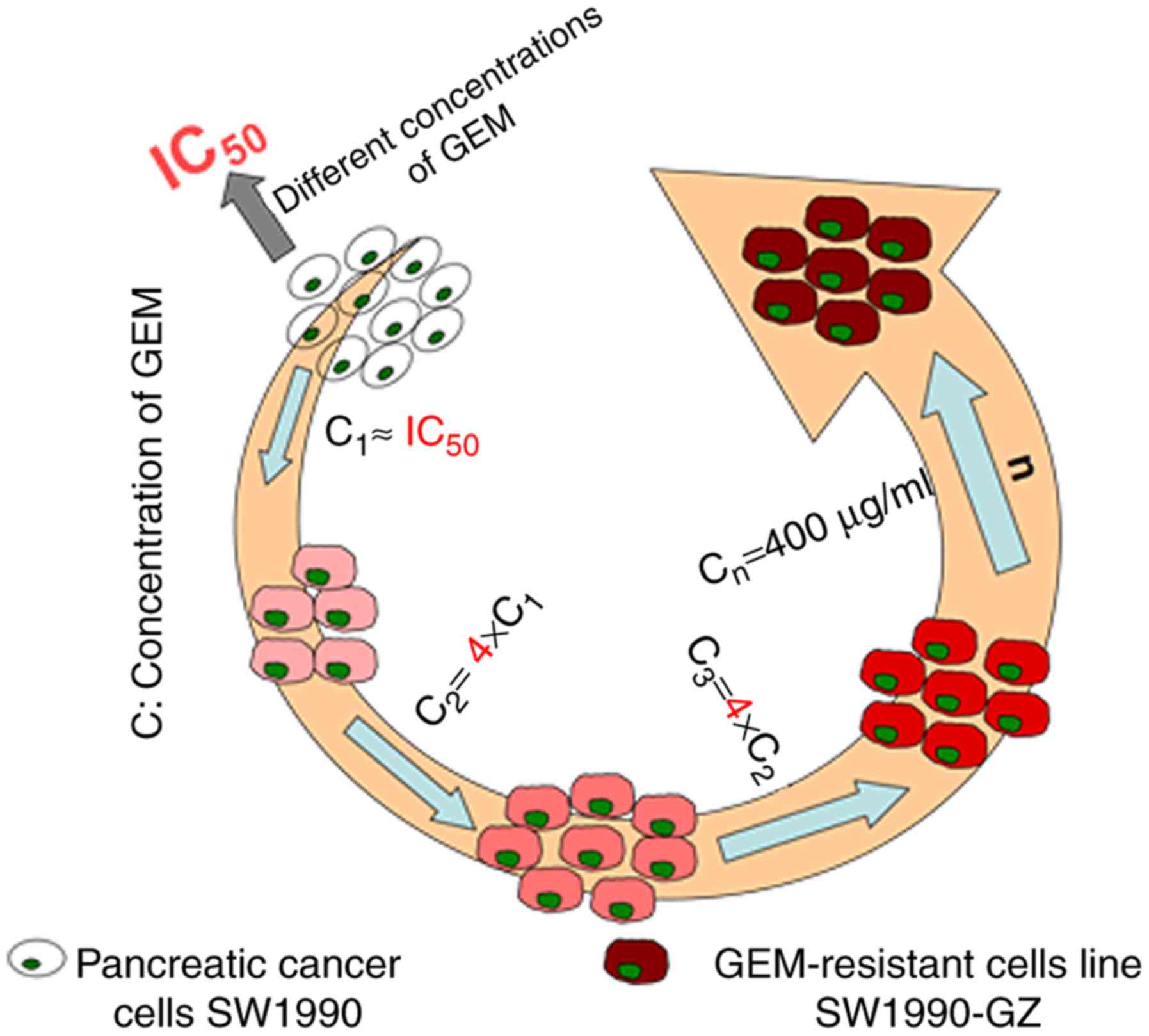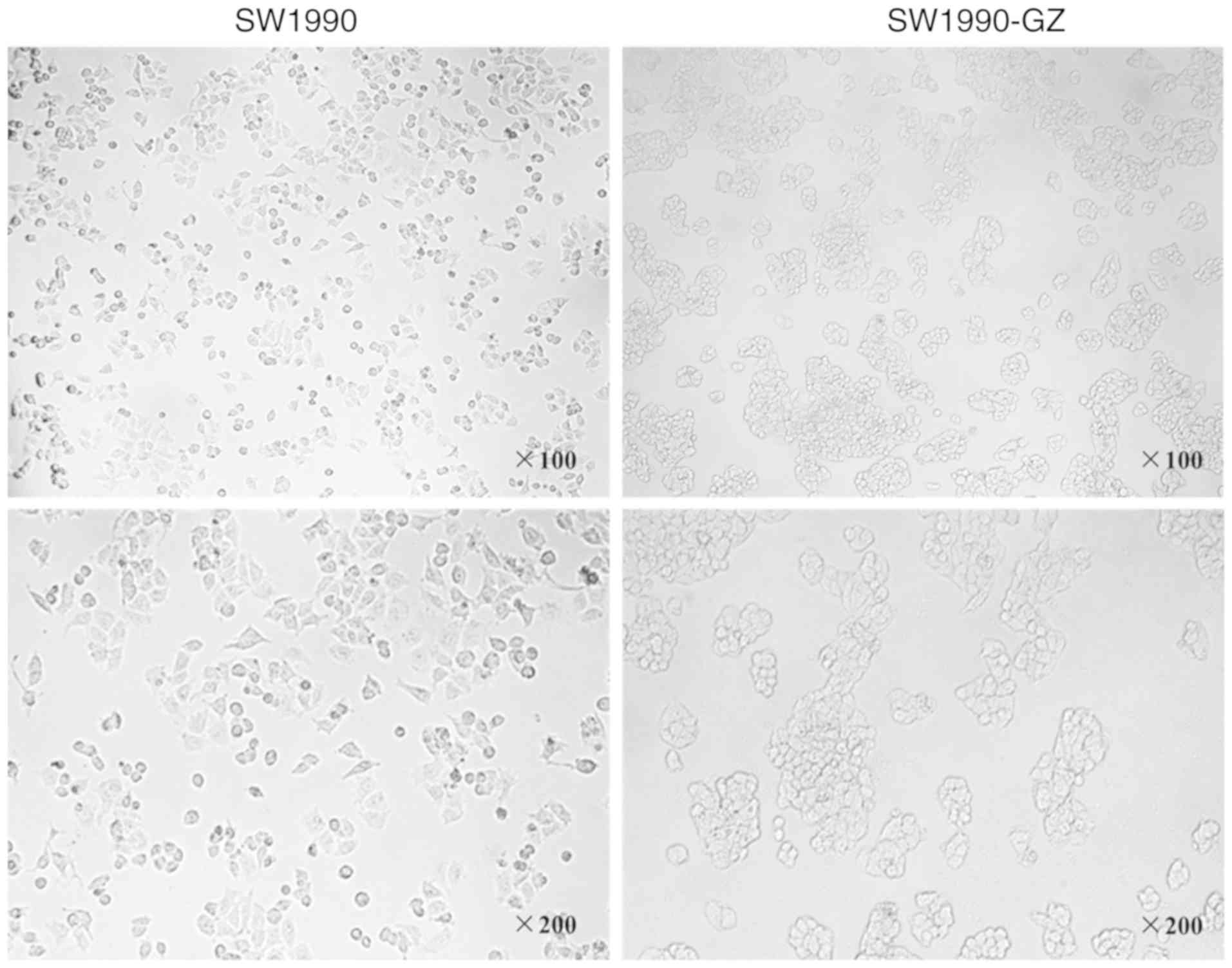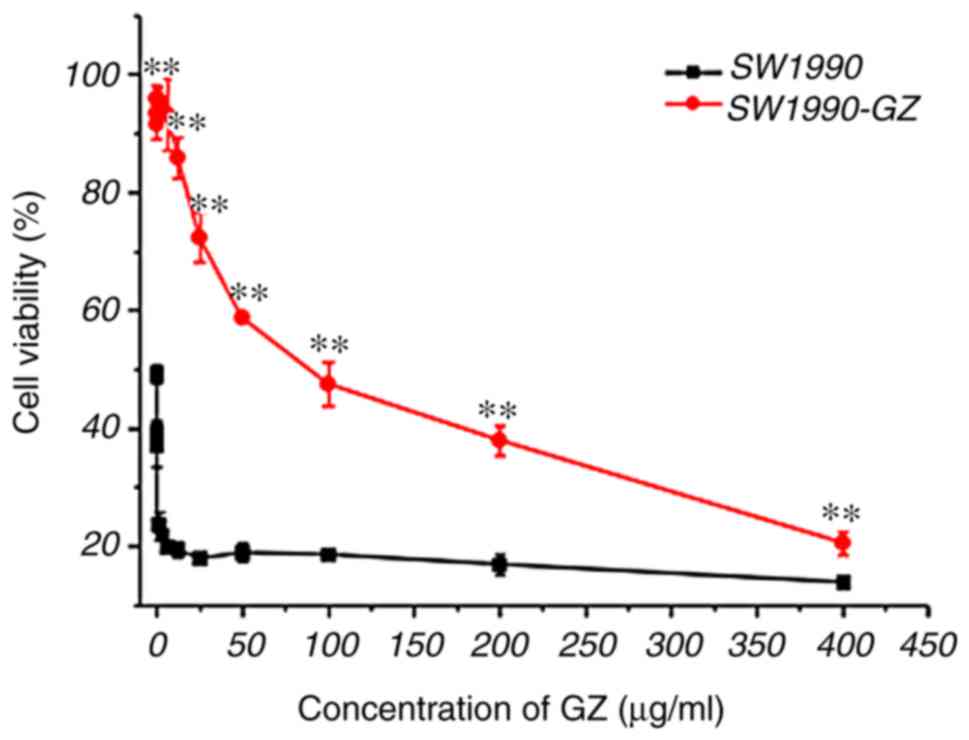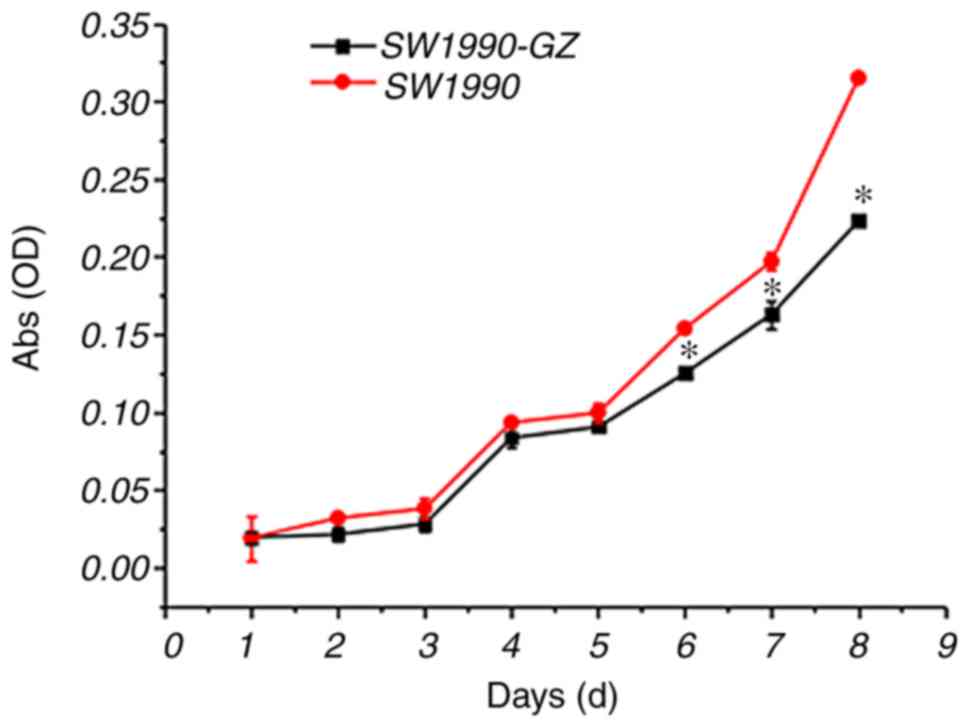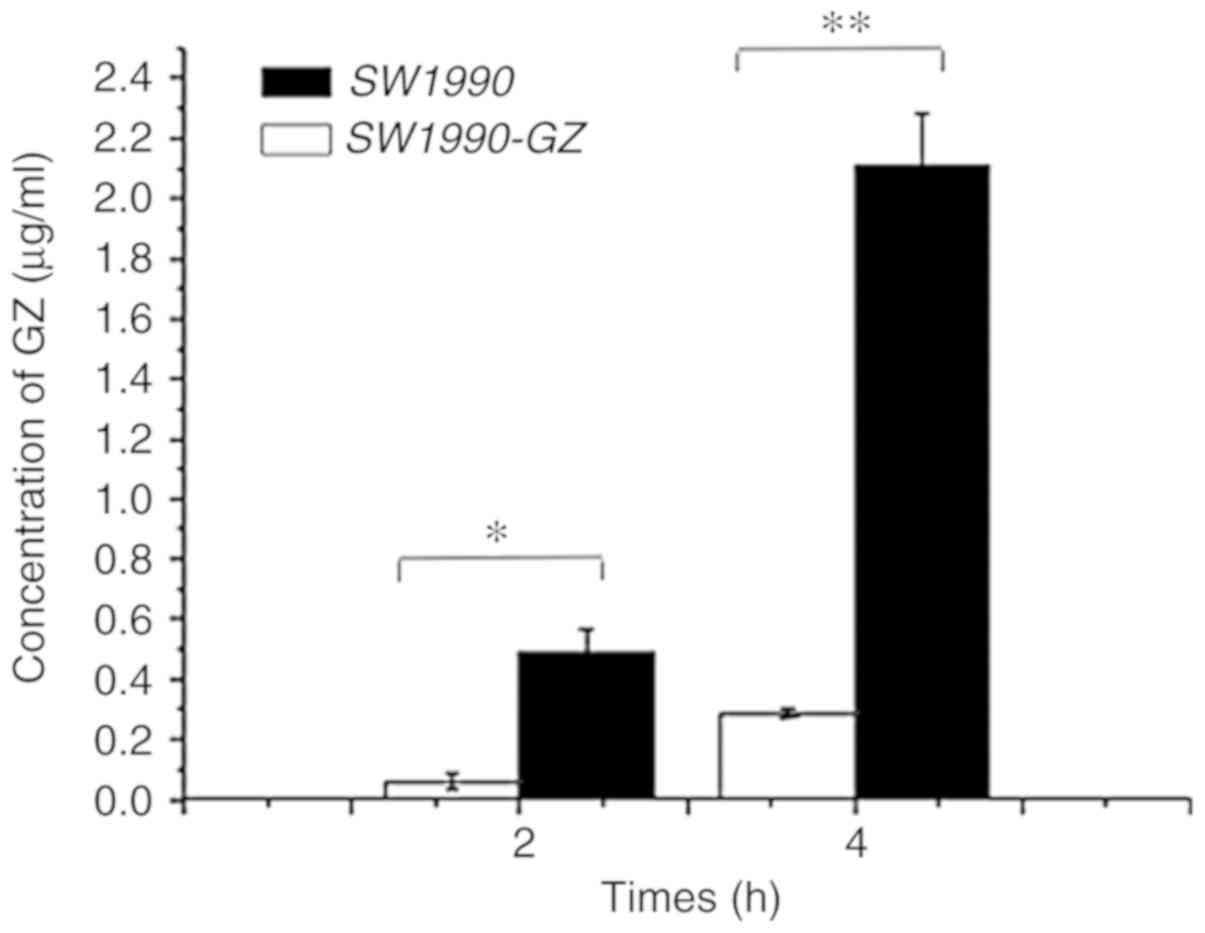|
1
|
Siegel RL, Miller KD and Jemal A: Cancer
statistics, 2016. CA Cancer J Clin. 66:7–30. 2016. View Article : Google Scholar : PubMed/NCBI
|
|
2
|
Edwards BK, Noone AM, Mariotto AB, Simard
EP, Boscoe FP, Henley SJ, Jemal A, Cho H, Anderson RN, Kohler BA,
et al: Annual Report to the Nation on the status of cancer,
1975–2010, featuring prevalence of comorbidity and impact on
survival among persons with lung, colorectal, breast, or prostate
cancer. Cancer. 120:1290–1314. 2014. View Article : Google Scholar : PubMed/NCBI
|
|
3
|
Chen YW, Liu JY, Lin ST, Li JM, Huang SH,
Chen JY, Wu JY, Kuo CC, Wu CL, Lu YC, et al: Proteomic analysis of
gemcitabine-induced drug resistance in pancreatic cancer cells. Mol
Biosyst. 7:3065–3074. 2011. View Article : Google Scholar : PubMed/NCBI
|
|
4
|
Chen W, Zheng R, Baade PD, Zhang S, Zeng
H, Bray F, Jemal A, Yu XQ and He J: Cancer statistics in China,
2015. CA Cancer J Clin. 66:115–132. 2016. View Article : Google Scholar : PubMed/NCBI
|
|
5
|
D'Angelo F, Antolino L, Farcomeni A,
Sirimarco D, Kazemi Nava A, De Siena M, Petrucciani N, Nigri G,
Valabrega S, Aurello P and Ramacciato G: Neoadjuvant treatment in
pancreatic cancer: Evidence-based medicine? A systematic review and
meta-analysis. Med Oncol. 34:852017. View Article : Google Scholar : PubMed/NCBI
|
|
6
|
Rakhra S, Strauss JB, Robertson J, McGinn
CJ, Kim T, Huang J, Blake A, Helenowski I, Hayes JP, Mulcahy M and
Small W Jr: Hypofractionated conformal radiotherapy with concurrent
full-dose gemcitabine versus standard fractionation radiotherapy
with concurrent fluorouracil for unresectable pancreatic cancer: A
multi-institution experience. J Gastrointest Cancer. 47:196–201.
2016. View Article : Google Scholar : PubMed/NCBI
|
|
7
|
Żmijewska-Tomczak M, Milecki P, Olek-Hrab
K, Hojan K, Golusiński W, Rucińska A and Adamska A: Factors
influencing quality of life in patients during radiotherapy for
head and neck cancer. Arch Med Sci. 10:1153–1159. 2014. View Article : Google Scholar : PubMed/NCBI
|
|
8
|
Rajabpour A, Rajaei F and Teimoori-Toolabi
L: Molecular alterations contributing to pancreatic cancer
chemoresistance. Pancreatology. 17:310–320. 2017. View Article : Google Scholar : PubMed/NCBI
|
|
9
|
Otake A, Tsuji D, Taku K, Kawasaki Y,
Yokoi M, Nakamori H, Osada M, Matsumoto M, Inoue K, Hirai K and
Itoh K: Chemotherapy-induced neutropenia as a prognostic factor in
patients with metastatic pancreatic cancer treated with
gemcitabine. Eur J Clin Pharmacol. 73:1033–1039. 2017. View Article : Google Scholar : PubMed/NCBI
|
|
10
|
Long J, Zhang Y, Yu X, Yang J, LeBrun DG,
Chen C, Yao Q and Li M: Overcoming drug resistance in pancreatic
cancer. Expert Opin Ther Targets. 15:817–828. 2011. View Article : Google Scholar : PubMed/NCBI
|
|
11
|
Soussi T, Dehouche K and Béroud C: p53
website and analysis of p53 gene mutations in human cancer: Forging
a link between epidemiology and carcinogenesis. Hum Mutat.
15:105–113. 2000. View Article : Google Scholar : PubMed/NCBI
|
|
12
|
Coggi G, Bosari S, Roncalli M, Graziani D,
Bossi P, Viale G, Buffa R, Ferrero S, Piazza M, Blandamura S, et
al: p53 protein accumulation and p53 gene mutation in esophageal
carcinoma. A molecular and immunohistochemical study with
clinicopathologic correlations. Cancer. 79:425–432. 1997.
View Article : Google Scholar : PubMed/NCBI
|
|
13
|
Dhayat SA, Mardin WA, Seggewiß J, Ströse
AJ, Matuszcak C, Hummel R, Senninger N, Mees ST and Haier J:
MicroRNA profiling implies new markers of gemcitabine
chemoresistance in mutant p53 pancreatic ductal adenocarcinoma.
PLoS One. 10:e01437552015. View Article : Google Scholar : PubMed/NCBI
|
|
14
|
Mezencev R, Matyunina LV, Wagner GT and
McDonald JF: Acquired resistance of pancreatic cancer cells to
cisplatin is multifactorial with cell context-dependent involvement
of resistance genes. Cancer Gene Ther. 23:446–453. 2016. View Article : Google Scholar : PubMed/NCBI
|
|
15
|
Elaskalani O, Razak NB, Falasca M and
Metharom P: Epithelial-mesenchymal transition as a therapeutic
target for overcoming chemoresistance in pancreatic cancer. World J
Gastrointest Oncol. 9:37–41. 2017. View Article : Google Scholar : PubMed/NCBI
|
|
16
|
Azmi AS, Bao B and Sarkar FH: Exosomes in
cancer development, metastasis, and drug resistance: A
comprehensive review. Cancer Metastasis Rev. 32:623–642. 2013.
View Article : Google Scholar : PubMed/NCBI
|
|
17
|
Ando T, Ichikawa J, Okamoto A, Tasaka K,
Nakao A and Hamada Y: Gemcitabine inhibits viability, growth, and
metastasis of osteosarcoma cell lines. J Orthop Res. 23:964–969.
2005. View Article : Google Scholar : PubMed/NCBI
|
|
18
|
Hong SP, Wen J, Bang S, Park S and Song
SY: CD44-positive cells are responsible for gemcitabine resistance
in pancreatic cancer cells. Int J Cancer. 125:2323–2331. 2009.
View Article : Google Scholar : PubMed/NCBI
|
|
19
|
Qiu H, Fang X, Luo Q and Ouyang G: Cancer
stem cells: A potential target for cancer therapy. Cell Mol Life
Sci. 72:3411–3424. 2015. View Article : Google Scholar : PubMed/NCBI
|
|
20
|
Bao Q, Zhao Y, Renner A, Niess H, Seeliger
H, Jauch KW and Bruns CJ: Cancer stem cells in pancreatic cancer.
Cancers (Basel). 2:1629–1641. 2010. View Article : Google Scholar : PubMed/NCBI
|
|
21
|
Tanaka M, Javle M, Dong X, Eng C,
Abbruzzese JL and Li D: Gemcitabine metabolic and transporter gene
polymorphisms are associated with drug toxicity and efficacy in
patients with locally advanced pancreatic cancer. Cancer.
116:5325–5335. 2010. View Article : Google Scholar : PubMed/NCBI
|
|
22
|
Garcia-Manteiga J, Molina-Arcas M, Casado
FJ, Mazo A and Pastor-Anglada M: Nucleoside transporter profiles in
human pancreatic cancer cells: Role of hCNT1 in
2′,2′-difluorodeoxycytidine-induced cytotoxicity. Clin Cancer Res.
9:5000–5008. 2003.PubMed/NCBI
|
|
23
|
Maréchal R, Mackey JR, Lai R, Demetter P,
Peeters M, Polus M, Cass CE, Young J, Salmon I, Devière J and Van
Laethem JL: Human equilibrative nucleoside transporter 1 and human
concentrative nucleoside transporter 3 predict survival after
adjuvant gemcitabine therapy in resected pancreatic adenocarcinoma.
Clin Cancer Res. 15:2913–2919. 2009. View Article : Google Scholar : PubMed/NCBI
|
|
24
|
Nordh S, Ansari D and Andersson R: hENT1
expression is predictive of gemcitabine outcome in pancreatic
cancer: A systematic review. World J Gastroenterol. 20:8482–8490.
2014. View Article : Google Scholar : PubMed/NCBI
|
|
25
|
Hagmann W, Jesnowski R and Löhr JM:
Interdependence of gemcitabine treatment, transporter expression,
and resistance in human pancreatic carcinoma cells. Neoplasia.
12:740–747. 2010. View Article : Google Scholar : PubMed/NCBI
|
|
26
|
Hesler RA, Huang JJ, Starr MD, Treboschi
VM, Bernanke AG, Nixon AB, McCall SJ, White RR and Blobe GC:
TGF-β-induced stromal CYR61 promotes resistance to gemcitabine in
pancreatic ductal adenocarcinoma through downregulation of the
nucleoside transporters hENT1 and hCNT3. Carcinogenesis.
37:1041–1051. 2016. View Article : Google Scholar : PubMed/NCBI
|
|
27
|
Sheikh R, Walsh N, Clynes M, O'Connor R
and McDermott R: Challenges of drug resistance in the management of
pancreatic cancer. Expert Rev Anticancer Ther. 10:1647–1661. 2010.
View Article : Google Scholar : PubMed/NCBI
|
|
28
|
Maréchal R, Bachet JB, Mackey JR, Dalban
C, Demetter P, Graham K, Couvelard A, Svrcek M, Bardier-Dupas A,
Hammel P, et al: Levels of gemcitabine transport and metabolism
proteins predict survival times of patients treated with
gemcitabine for pancreatic adenocarcinoma. Gastroenterology.
143:664–674.e6. 2012. View Article : Google Scholar : PubMed/NCBI
|
|
29
|
Cascinu S, Graziano F, Del Ferro E,
Staccioli MP, Ligi M, Carnevali A, Muretto P and Catalano G:
Expression of p53 protein and resistance to preoperative
chemotherapy in locally advanced gastric carcinoma. Cancer.
83:1917–1922. 1998. View Article : Google Scholar : PubMed/NCBI
|
|
30
|
An Y, Yao J, Wei JS, Lu ZP, Cai HH, Dai
CC, Qian ZY, Xu ZK and Miao Y: Establish a gemcitabine-resistant
pancreatic cancer cell line SW1990/GZ and research the relationship
between SW1990/GZ and pancreatic cancer stem cell. Zhonghua Wai Ke
Za Zhi. 48:999–1003. 2010.(In Chinese). PubMed/NCBI
|
|
31
|
Niu BZ, Chen G, Li LJ, Wu YD and Zhao YP:
Drug resistance and activity changes of thioredoxin reductase in
pancreatic cancer cells strain SW1990 induced by gemcitabine.
Zhongguo Yi Xue Ke Xue Yuan Xue Bao. 27:606–610. 2005.(In Chinese).
PubMed/NCBI
|















